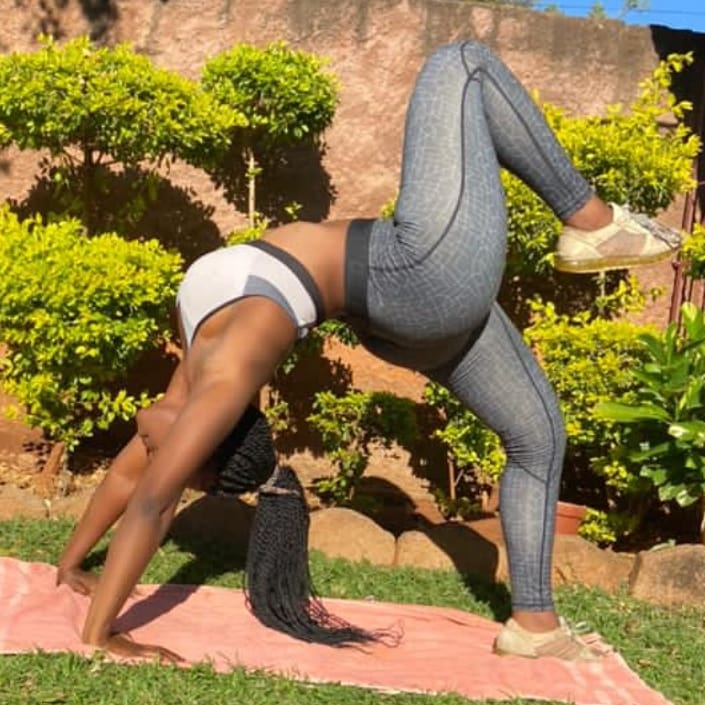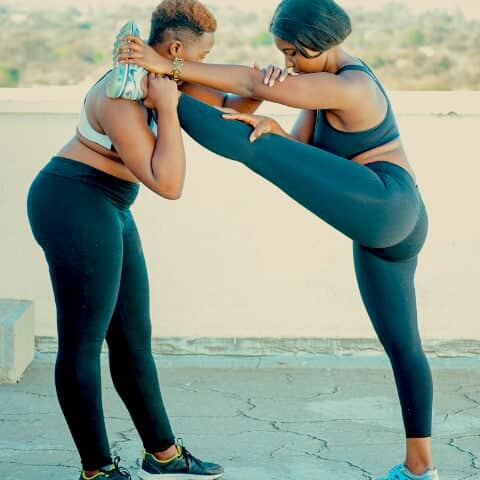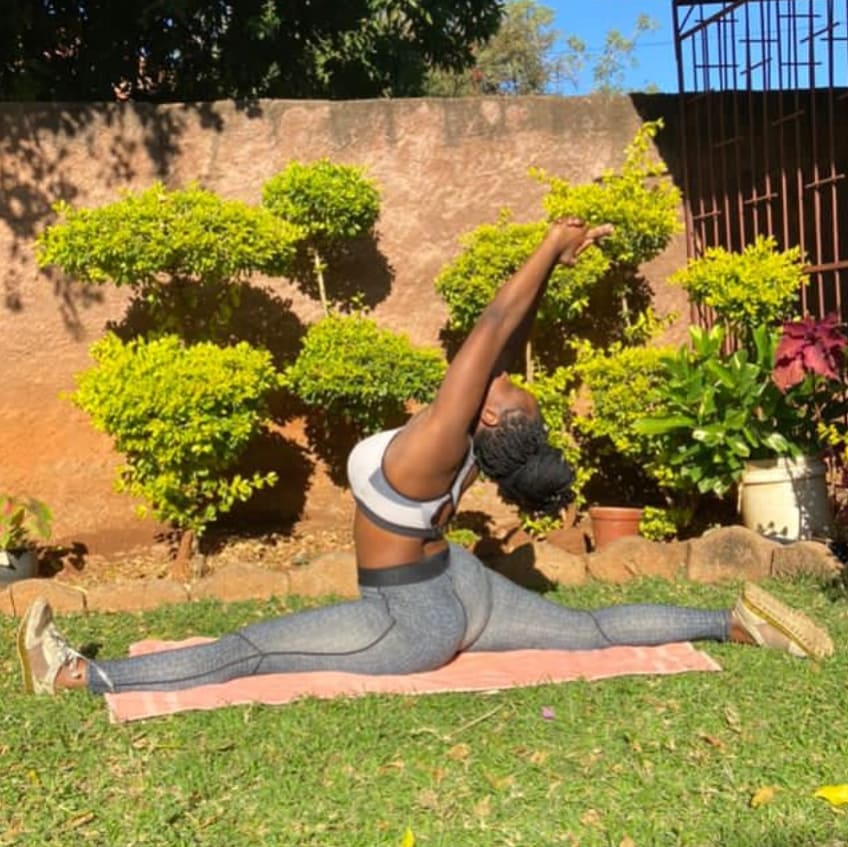The Covid-19 lockdown has seen many people out of work, it has seen thousands picking up on long lost hobbies and past times.
Health experts have also emphasised the importance of health and fitness, as the pandemic is raging, as studies have shown that physical fitness makes it easier for the body to fight the virus, as compared to an unhealthy person.
With the closure of gyms and other recreational facilities, thousands of people have had to seek alternatives.
This has seen the sprouting of online gyms and virtual health and fitness communities.
Fitness trainers who are out of work have had to adapt and remodel their work offerings to work from home, like most people.
Some are finding it hard because all the equipment they are accustomed to using is locked up in gyms, and they are home.
However, some people have indeed found the proverbial silver lining in the dark cloud.
Sinamathamsanqa Mvemve, a journalism graduate is counting her gains despite losing her job as a marketing communications executive owing to the Covid-19 induced lockdowns.
A local firm she worked for is one of those that failed to endure the economic shops and had to fold in May 2020 as a result of the Covid-19 lockdowns that meant a cut on business.
As lockdowns were extended for the greater part of 2020, Sina had to dust herself and continue living.
Now an Instagram sensation, the Mpopoma suburb woman turned a hobby into a business and is now a sought after fitness trainer.

“When I lost my job I thought the world was caving in. To keep myself sane I exercised and practised yoga a lot, and as a lover of social media, it comes naturally with my work as a marketer, I posted a lot of my workout videos on Facebook and Instagram. I have been amassing a steady following and I now teach fitness classes for women, especially women who want to want to shape up after birth and overweight women who want to start living healthier lives. My sessions are very affordable and friendly and do not need any monetary investments. We only work with what we have at home, so you have no excuse at all.
“I preach wellness and not looking skinny or showing off abs. I believe there are women out there who have a good or correct body mass index but are not fit at all and have very poor eating habits. This has been quite a journey for myself as well as I have grown so much from this. Our sessions are also mental health support groups in a way as women vent and we are a safe space, we talk about our insecurities and then use exercise to take it all out,” said Mvemve.
Mvemve added that she combines her academic side, what she learnt in health communication at Nust, with lived realities and calls for people to take an interest in issues of health and temperance.
“I take most of my motivation from my health communication module taught at Nust. I enjoyed it and now I am using it to build healthier communities. The biggest challenge in our communities is rooted in bad diets. And it’s unfortunate that we are teaching our kids bad eating habits. Just because you can afford to eat fast food every day for the week does not mean that you should. Your health can’t afford it. Exercise also helps you manage existing health conditions. I have sinus problems and insomnia but with exercise, my nasal health is great and I sleep well,” she said.
She advised young people to harness the power of social media for income-generating activities, which she said could be a lever against poverty.
“Most of my clients are referrals, many come via inboxes from my social networks and people love working with me because I emphasise the zero equipment way to fitness. The only thing that my trainees must have is a skipping rope or jump rope, and at home, one can substitute this with an electric cable or any other rope that can work.”
“After all we are on lockdown, so people’s finances are limited, you do not want to be telling people to invest in exercise equipment at a time when they are trying to stretch their dollars to ensure that families have enough to eat. Most people have very sedentary lifestyles and the lockdowns have worsened this situation. To make matters worse, what we are eating does not go down well with those lifestyles,” added Sina.
CITE spoke to some women who joined the fitness classes and they said the virtual fitness clubs have helped them cope with stresses brought by lockdown and have also worked on their health.
Tinotenda Munyira from Northend suburb said her physical fitness was important as she had previously suffered poor health due to a sedentary lifestyle.
“My physical fitness is important to me because of my health. My experience with Sina has been great because I managed to regain my confidence (body positivity). I was overweight but she encouraged me to exercise and eat healthily. She gave me workout routines and a diet plan as well. I have lost about 10 kg so far. I am a size 38 from size 42. My body has also become more flexible than before and my blood pressure has become normal,” said Tinotenda.
She said Sina was a great person to work with and recommended her to other people wanting to improve their health.
Another trainee, Sharon Lindelwa Dube from Gwabalanda suburb said she came from a family with hereditary chronic conditions and used exercise and healthy eating to try and fight for a healthier life ahead.

“I am a chubby person. Working out is not for me to get thin, but it is for my well-being want to keep a fit body. Genes come at play, everyone in my family is big and tall, and I’m not so far from my lineage, for me to be in really ambitious of me. But to keep fit and healthy is my aim. In my family chronic illnesses such as diabetes and heart conditions are prominent, so my fitness journey is me taking a stand to fight for a healthier life before I am even diagnosed of any of those conditions. I have skin issues, but the more I exercise and drink a lot of water, the more my skin clears up. Exercise also helps me deal with stress, at work, I deal with numbers so an outlet such as exercise that helps me deal with stress is welcome. Working with Sina is great as I am working with a friend, a sister, a peer, someone who understands and is patient, she said.
Director of Health Services in the Bulawayo City Council, Dr Edwin Sibanda in an interview with CITE said physical fitness was important for the maintenance of good public health in the city.
He said most people with chronic illnesses were suffering the consequences of poor lifestyles and said a lifestyle revolution was needed in the city to ensure that people had better eating habits and a total lifestyle overhaul for better health.
“Public health and general wellness is something that we take seriously as a city. Wellness goes beyond just your health. Poor health becomes an economic issue because most of these chronic conditions are very expensive to manage. Just visit a number of pharmacies and find out how much insulin costs. Sadly, most of these Non-Communicable Diseases are from poor lifestyles and bad eating habits, something that is within our control. For a healthier city we must all eat well, exercise and ensure that we take good care of our bodies because being sick is very expensive. Many of the leading NCDs can be avoided if people live healthier lives and the key to it all lies in what you eat and how much physical activity you do,” said Dr Sibanda.
Section 687 of the National Development Strategy 1 speaks about the promotion of sport for health which will be done with the aim of improving public health and general wellness in the country, especially as the country is battling a big non-communicable disease problem.
“The promotion of sport for health will be intensified during the NDS1 Period to achieve increased public health and well-being. The following strategies will be implemented: Establish community clubs that promote healthy lifestyles; Stakeholder engagement in the purchase and maintenance of equipment and consumables for wellness programmes; and Establish community nutritional programmes and community support groups.”


Your post provided a fresh perspective on this topic. For more details, click here.
Ji ha
Losing weight was always a struggle, but this incredible product made it easier than ever. I went from 85kg to a lean and confident 60kg. Take control of your weight – click here to order!